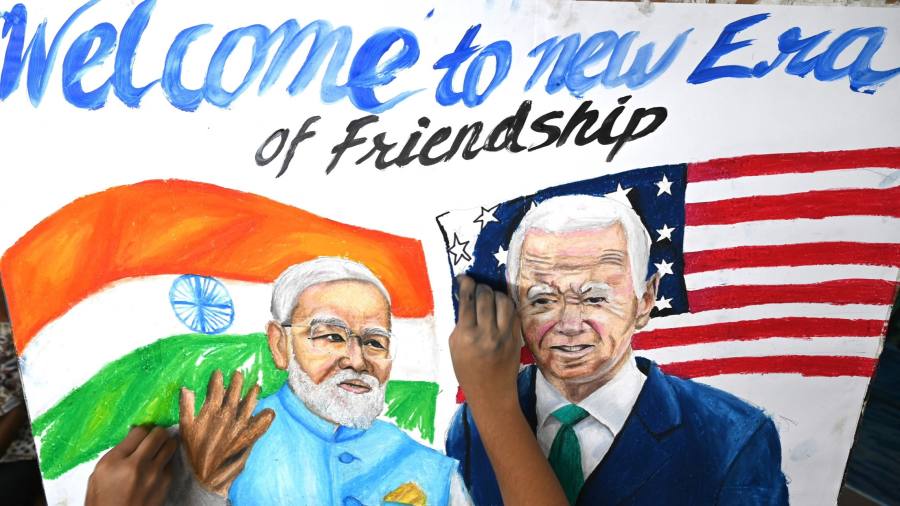Receive free G20 updates
We’ll send you a myFT Daily Digest email rounding up the latest G20 news every morning.
US president Joe Biden and Narendra Modi, India’s prime minister, moved to cement ties in defence and technology during a meeting in New Delhi that underscored the burgeoning strategic co-operation between the two countries.
Gathering on the eve of the G20 summit in the Indian capital, Biden and Modi touted a “close and enduring partnership” that has become an emerging force in global diplomacy, with both countries harbouring suspicions about Chinese power and influence.
There was little new substance in a lengthy joint statement issued after the meeting, which was held at Modi’s residence. The two leaders largely restated and built on pledges to each other that had been made over the past few months, including when Biden hosted the Indian prime minister at the White House in June.
But the positive tone was critical, US officials said. Kurt Campbell, the White House coordinator for Indo-Pacific affairs, said there was now an “undeniable warmth and confidence” between Modi and Biden that marked a sea change for US-India relations.
On the US side, Campbell said he believed the bilateral relationship with India would be the most important of the 21st century for Washington, while there was a “dawning Indian awareness of the importance of its role” in the world.
Campbell also said it had not gone unnoticed in New Delhi that Chinese president Xi Jinping and Russian president Vladimir Putin were not attending the G20 summit, which has been hugely important to Modi. “I think it is a disappointment for India that Russia and China aren’t here,” Campbell said.
In the joint statement, India and the US welcomed the approval by the US Congress of negotiations for a commercial agreement between GE Aerospace and India’s state-owned Hindustan Aeronautics Ltd (HAL) to manufacture GE F-414 jet engines in India.
The two countries also announced the conclusion of a second ship repair agreement under which India will maintain US navy vessels in the country.
Biden “welcomed” a request from India’s ministry of defence to procure 31 General Atomics MQ-9B drones, which the two countries said would “enhance the intelligence, surveillance and reconnaissance capabilities of India’s armed forces across all domains”.
India — which has an unresolved border dispute with China, with which it fought a war in 1962 — is leaning heavily on the US as it seeks to close a gap in military preparedness and high tech. It has also been working more closely with the US in areas ranging from semiconductors and telecommunications to quantum computing and artificial intelligence.
Meanwhile, the two countries said they would boost their co-operation in the nuclear energy sector. They also resolved their last trade dispute at the WTO over poultry, including steps by India to cut tariffs on US frozen duck and turkey, as well as dried blueberries and cranberries.
On the diplomatic front, Biden praised India’s leadership of the G20, supported India’s bid for a permanent seat on the UN Security Council, and agreed to return to New Delhi in 2024 for a meeting of the leaders of the Quad, a strategic pact that also includes Japan and Australia.
As Biden has pressed ahead with closer ties with Modi, he has been criticised for overlooking a troubling backslide in Indian democracy, including a crackdown on free expression and the incitement of violence against minority Muslims and Christians. Campbell said Biden had told Modi that the health of democracy was “an important issue in our bilateral relationship”.
“I think the key here is for us to maintain a respectful dialogue, and to approach some of the challenges with the degree of humility given some of the challenges that we face, in our own country as well,” Campbell said.
Read the full article here




